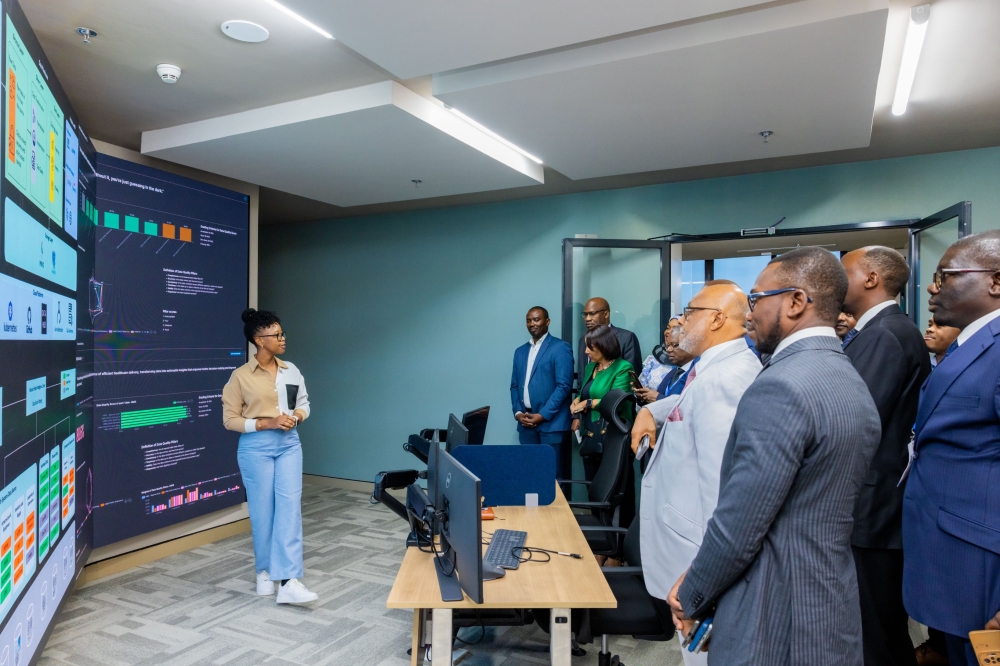

With the help of mathematical models, medics at the Ministry of Health expect to be able to predict disease trends months ahead, thanks to the newly launched Health Intelligence Centre.
The highly advanced centre, officially launched this month, employs coders, data scientists, mathematicians, and public health experts, who are working towards better monitoring of the health system as well as responding to health threats across the country.
ALSO READ: Rwanda unveils real-time health monitoring hub
In addition, thanks to data-driven predictions, traditional interventions like indoor residual spraying may also soon become more targeted. For instance, rather than spraying entire areas, health workers may start to precisely focus on specific high-risk locations identified through mathematical models.


"We need to have a mathematical understanding of the nature and behaviour of particular diseases so that we can intercept them before they affect populations,” said Muhammad Semakula, the Head of Department for Planning, Monitoring, Evaluation and Health Financing at the Ministry of Health.
Such a system, he says, is key to slowing or stopping the spread of diseases by identifying risks early, taking into account various factors including whether it&039;s transmission through direct contact like shaking hands, or through airborne particles in crowded spaces.
In addition, scientists at the centre are also capable of forecasting potential health situations that have not yet emerged in the country, using mathematical and technological simulation techniques.
"You don’t have to wait for a disease to enter the country,” he noted, explaining that by developing mathematical models that take into account natural patterns and various other factors, scientists can predict possible threats and prepare interventions in advance.
ALSO READ: Rwanda set to pilot ‘virtual hospital’
The scientists at the centre, he says, can forecast up to three months in advance and alert Ministry of Health teams about the expected number of infection cases in specific areas. This allows them to begin implementing targeted preventive or responsive measures before a threat escalates.
"That is information that is very useful, very precise, and important for targeted intervention because we know exactly where a problem is and we can tackle it from that particular area. This also means a lot in terms of avoiding things like lockdowns which paralyse the economy,” he noted.
The centre will be capable of monitoring some health services in real time, in addition to consolidating data from various facilities and communities in order to conduct analysis and inform policies.
The centre’s work also includes tracking the use of public equipment like ambulances and hospital fridges, to the collection of data on medical procedure outcomes in hospitals so as to take relevant steps in terms of decision-making.
It comprises several departments, such as a data warehouse that stores and monitors various types of data, including patient care information, routine reports from health facilities and community health workers, and community feedback, such as social media discussions about health services and issues.
One of the centre’s key functions is to conduct in-depth analysis of health outcomes, such as identifying the causes behind specific trends and determining possible solutions.
Such information can be input into machine learning models, which can predict potential future outcomes and warn medics based on patterns from past cases.
These machine learning models can use artificial intelligence to predict situations. For example, with this technology, the system can inform the doctors that a particular woman visiting the facility is at high risk for pregnancy complications or adverse outcomes.
ALSO READ: Rwanda to fully digitise health records by December
The use of technology is part of the country’s ongoing efforts to address the challenges caused by shortages of doctors and specialists.
In 2023, the government launched the 4x4 Reform, a strategy aimed at quadrupling the number of healthcare workers in the country to meet the WHO recommendation of at least four healthcare professionals per 1,000 population density.
The Ministry of Health is also preparing to launch a pilot project for a "virtual hospital," a new facility that will allow medical specialists to consult with and treat patients remotely across the country.
The specialists will be based in a central location in Kigali but will be able to support patients and healthcare providers in hospitals and clinics nationwide without needing to be physically present.
Under the 4x4 reform, the health sector is projected to expand its pool of health professionals, including residents, fellows, general practitioners, dental surgeons, pharmacists, nurses, midwives, and allied health sciences personnel.
By 2028, the ambitious plan aims to increase the health workforce by a total of 32,973 personnel.


